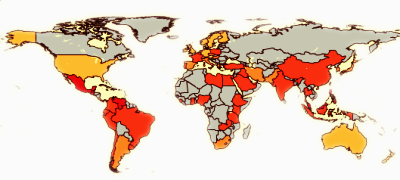¿Cómo podemos comparar la cultura de dos países?
Geert Hofstede analizó una base de datos de empleados de IBM, una corporación presente en más de 70 países, buscando diferencias en la cultura de los distintos países.
Para cada país, se extrajeron 5 rasgos:
- Distancia de poder(power distance index): a mayor número, más diferencia entre las distintas clases. Por ejemplo Alemania tiene un puntaje de 35, mientras que Chile tiene un índice de 63 y Guatemala de 95.
- Individualismo: a mayor número, más importante es el individuo respecto al colectivo. Un país como Estados Unidos, por ejemplo, tiene un puntaje de 91, Alemania 67 y China tiene un puntaje de 20.
- Masculinidad: indica el grado en el cual los valores más asociados estereotípicamente con el hombre (éxito material, centrarse en sí mismo, poder, fuerza, etc.) son más importantes que los valores asociados con la mujer (importancia de las relaciones, calidad de vida, etc.). Japón tiene un puntaje de 95 siendo la sociedad más prototípicamente "masculina" de las ranqueadas, mientras que Suecia tiene un puntaje de 5, siendo la sociedad más prototípicamente "femenina" en el ranking.
- Aversión por la incertidumbre: esto indica qué tanto una sociedad evita situaciones inciertas o con poca estructura. Grecia en esta escala tiene un índice de 112, mientras que en Singapur la incertidumbre es mucho menos tolerada, con un puntaje de 8.
- Orientación al largo plazo: mide qué tan importantes son la persistencia y la tradición respecto a los valores de más corto plazo. En este sentido China tiene un índice de 118 y el índice es más alto en países asiáticos que en occidente donde por ejemplo Noruega tiene un puntaje de 20. Lamentablemente este puntaje está disponible sólo para unos pocos países.
El sitio oficial de Geert Hofstede tiene una
herramienta para comparar países. Por ejemplo si comparamos Chile y España, vemos que España es una sociedad más individualista y más orientada hacia valores masculinos que Chile.
El sitio ClearlyCultural.com tiene una serie de
mapas del mundo mostrando los puntajes. Por ejemplo este es el mapa de distribución del índice de distancia de poder (más rojo significa más desigual):
